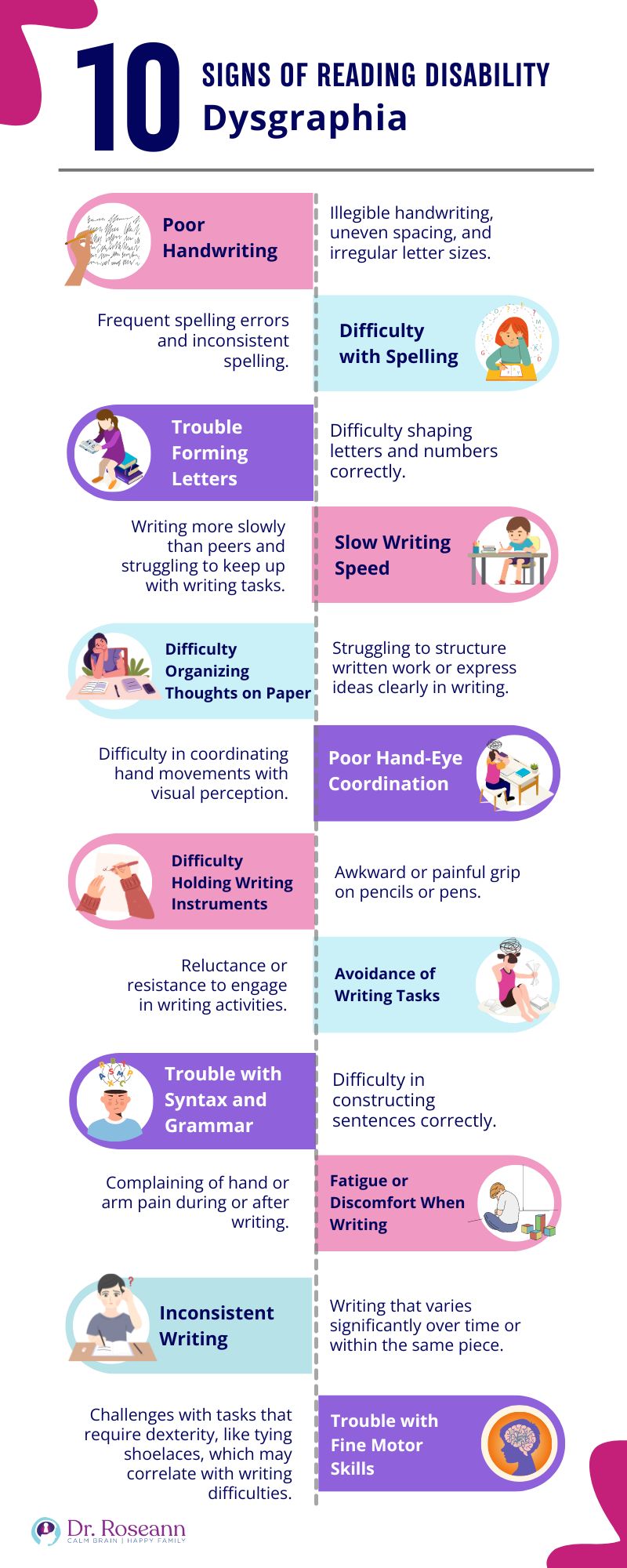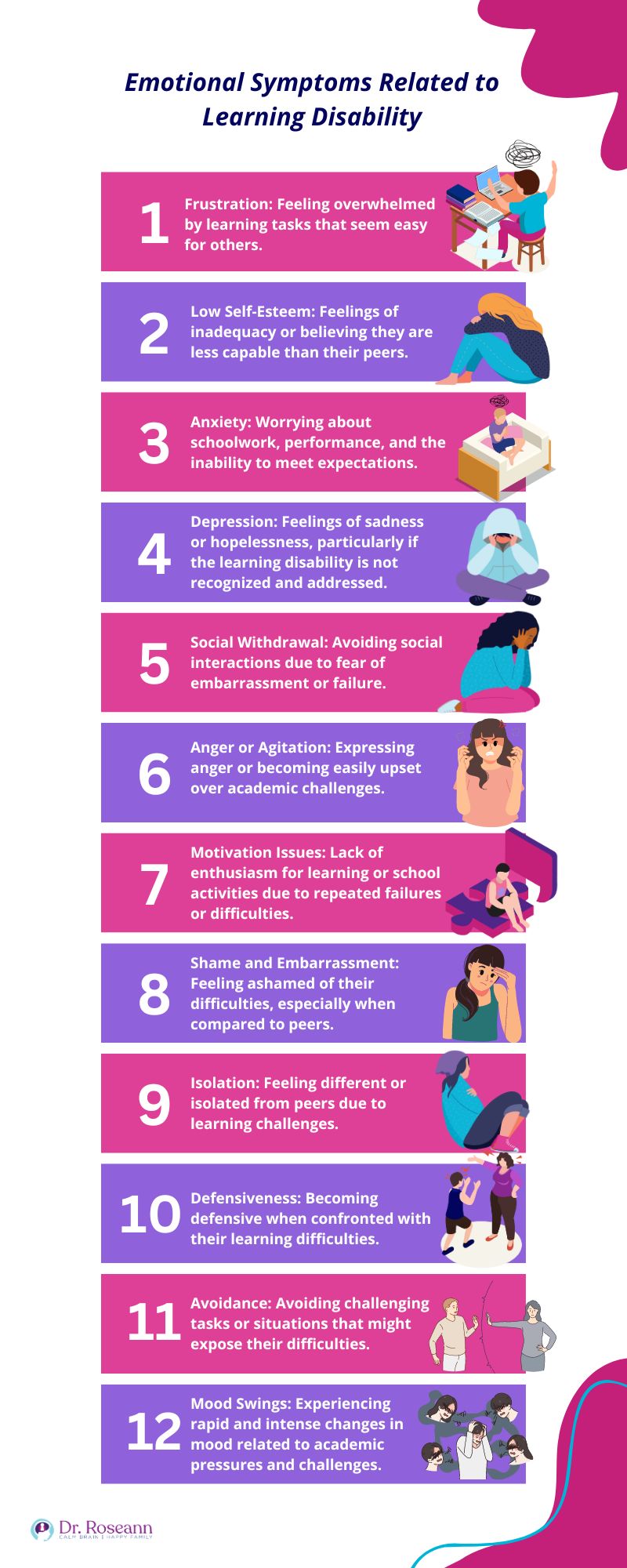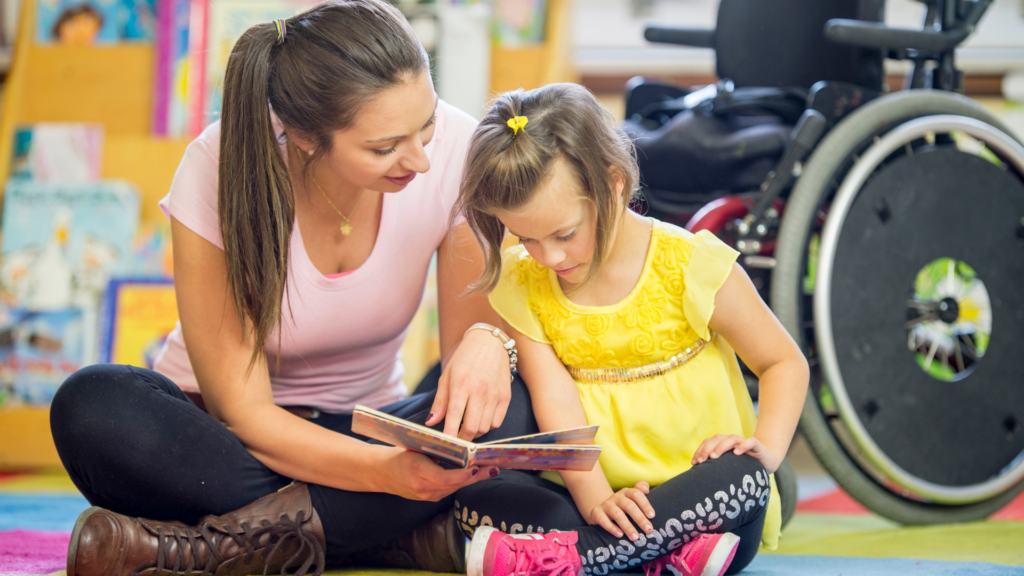Learning disabilities can significantly impact an individual's academic performance and overall well-being. Recognizing the learning disability symptoms is crucial for early intervention and appropriate support.
Let’s explore the common signs of learning disabilities and emphasize the importance of seeking a professional learning disability assessment, which I have been doing for the past three decades. So, how do you know if you have a learning disability? Here are the common learning disabilities symptoms:
Academic Struggles
Learning disorders in children often manifest as challenges in acquiring and utilizing essential skills such as listening, speaking, reading, writing, or mathematics. Individuals may experience difficulties that are not aligned with their age, grade level, or cognitive abilities.
Inconsistent Performance
Discrepancies between intellectual ability and academic achievement are common signs of learning difficulties. Some individuals may demonstrate average or above-average intelligence but struggle with specific subjects, leading to inconsistent performance.
Signs of Reading Disability – Dyslexia
Dyslexia is a well-known learning disability that affects reading and decoding skills. Individuals with dyslexia may struggle with recognizing words, understanding phonics, and spelling. Recognizing these challenges is crucial for tailored interventions and support.
Writing Learning Disability – Dysgraphia
Dysgraphia is a learning disability in writing. Individuals with the dysgraphia learning disability may face difficulties with handwriting, spelling, and organizing their thoughts on paper. Understanding these challenges helps educators and professionals provide appropriate accommodations.

Math Problems – Dyscalculia
Dyscalculia is a learning disability that affects mathematical abilities. Individuals with dyscalculia may struggle with understanding mathematical concepts, performing calculations, and solving mathematical problems. This is what dyscalculia looks like and early identification helps with targeted interventions.
Attention and Focus Issues
Learning disabilities, such as Attention-Deficit/Hyperactivity Disorder (ADHD) and other conditions that may have learning disability as a symptom, can impact attention, concentration, and impulse control. Recognizing attention and focus issues when learning with a disability is crucial for implementing strategies that support the individual in academic settings.
Memory Difficulties
Difficulty in remembering information, instructions, or sequences of tasks is another potential sign of a learning problem. Understanding the role of memory challenges helps professionals develop effective learning strategies.
Slow Processing Speed
Children's learning difficulties are characterized by slow processing speed. Slow kids take longer to absorb and respond to information. Recognizing this aspect is essential for providing additional time or alternative methods for completing tasks.
Social and Emotional Impact
Learning disabilities can influence an individual's social and emotional well-being (Munter & Ghesquière, 1999). Frustration, anxiety, and feelings of overwhelm are common. Addressing these challenges requires a holistic approach that includes emotional support alongside academic interventions.
Recognizing the signs of learning disability issues is the first step toward providing appropriate support. If you suspect a learning disability, it is crucial to seek a professional learning disability test from psychologists, educational specialists, or healthcare providers. Early intervention and tailored strategies can make a significant difference in the academic and personal success of individuals with childhood learning disabilities.

What are learning disabilities?
Learning disabilities in children, teens, and adults are neurological conditions that affect an individual's ability to acquire, process, and use information effectively. These conditions can impact various cognitive skills, leading to difficulties in learning, despite average or above-average intelligence.
What are the signs of a learning disability in a teenager?
Recognizing the signs of learning disorders in a teenager involves observing persistent academic struggles, inconsistent performance, and challenges in specific areas such as reading, writing, or math. Executive functioning issues, attention and focus problems, and social-emotional struggles may also indicate the presence of a learning difficulty.
What are the signs of a learning disability in adults?
Identifying adult learning disabilities involves recognizing challenges such as difficulties with reading, writing, math, executive functioning, attention, memory, and communication. Aside from these common signs of learning difficulties in adults, social and emotional struggles, job performance issues, and challenges with technology and learning new information are also observed.
What is specific learning disabilities?
Specific Learning Disabilities (SLD) refer to a group of neurological disorders like dyslexia that affect an individual's ability to acquire and use academic skills effectively. These difficulties are specific to certain areas of learning, and individuals with SLD typically have average or above-average intelligence in other areas.
Why am I a slow learner?
Having a slow learning disability can stem from diverse factors such as individual learning styles, gaps in foundational knowledge, attention and focus issues, potential learning disabilities, and environmental influences. Emotional well-being, including stress and motivation, can also impact learning.
Is being slow a disability?
Being slow in certain aspects, such as processing information or completing tasks, is not necessarily a disability on its own. Individuals may vary in their pace of learning or executing activities due to factors like cognitive processing styles, attention, or working memory.
What are learning disability examples?
There are different types of learning disabilities and they encompass a range of challenges affecting specific cognitive processes and academic skills. Examples of learning disabilities include dyslexia, which involves difficulties in reading, dysgraphia, affecting writing skills, and dyscalculia, impacting mathematical abilities.
What are the signs of learning disability in 5 year-old?
Signs of a potential learning disability in a 5-year-old may include speech and language delays, delayed motor skills, challenges in reading and math readiness, social and behavioral differences, attention difficulties, and memory issues.
How to diagnose learning disability in children?
Diagnosing a common learning disability in a child involves a comprehensive assessment process, including educational evaluations, psychological assessments, speech and language evaluations, occupational therapy assessments, and medical examinations. Currently, the diagnosis of learning disabilities is based on a comprehensive assessment process that involves evaluating a range of cognitive, academic, and behavioral factors.
What is a language based learning disability?
A language-based learning disability (LBLD) is a type of learning disability that primarily affects the acquisition and use of language skills. Individuals with language based learning disabilities may experience challenges in understanding, using, and processing spoken or written language.
What is learning disabled?
Being a learning-disabled student simply means having a learning deficiency. It's important to note that the term emphasizes the challenges individuals may face in certain areas of learning, but it does not define their overall intelligence or potential.
What is a SPED kid?
The term “SPED kid” is an informal abbreviation for a child receiving special education services. “SPED” stands for Special Education, and it is a broad term that encompasses educational programs and support services designed to meet the unique needs of students with learning disabilities or learning challenges. Students with learning disabilities typically have problems in specific academic areas, such as reading, writing, mathematics, and language skills.
What is a specific learning difficulty?
A specific learning difficulty, often referred to as a specific learning disorder, is a neurodevelopmental condition that affects the acquisition and use of certain academic skills. This difficulty of learning is specific to particular areas of learning, such as reading, writing, or mathematics.
Do I have a learning disability?
If you're experiencing persistent challenges in specific academic areas or noticing difficulties in tasks like reading, writing, or mathematics, it's a good idea to consider seeking professional assessment and guidance when taking a learning difficulties test.
How to test for learning disabilities?
A learning disabilities test involves a comprehensive process, starting with initial screenings by teachers or healthcare professionals and progressing to in-depth assessments conducted by various specialists. Learning disability testing includes educational assessments, psychological evaluations, speech and language assessments, and occupational therapy evaluations are among the key components used to identify general learning difficulties.
What are the top 5 learning disabilities?
The top five learning disabilities include dyslexia, which affects reading and language processing; dysgraphia, impacting writing skills; dyscalculia, influencing mathematical abilities; Attention-Deficit/Hyperactivity Disorder (ADHD), affecting attention and executive functions; and Auditory Processing Disorder (APD), impacting the interpretation of auditory information.
How to get tested for a learning disability in college?
To undergo a learning disorder test in college, contact the disability services or accommodations office at your institution and request a meeting to discuss your concerns. Provide any existing documentation and be prepared to undergo formal assessments, which may include cognitive, academic, and psychological evaluations conducted by qualified professionals.
What is the most commonly diagnosed learning disability?
Dyslexia is a learning disability that’s very common around the world (Mather et al., 2020). It is a language-based learning disability that primarily affects reading and language processing skills. Dyslexia is often identified early in a person's academic journey. With appropriate interventions and support, individuals with dyslexia can develop effective strategies to overcome challenges and succeed in their education.
What is the defining characteristic of a learning disability?
The defining learning disability characteristics include significant difficulty in acquiring and using specific academic skills, which is not solely attributed to factors such as intellectual disabilities, lack of educational opportunities, or environmental influences.
How do I know if my son has dyslexia?
Identifying dyslexia in your son involves recognizing signs such as reading difficulties, spelling challenges, and phonological awareness issues. Consult with his teachers to gain insights into his academic performance and seek a comprehensive assessment by educational psychologists or learning disability specialists.
What does special educational needs mean?
“Special educational needs” (SEN) is a term used in the field of education to describe the additional support and resources required by individuals who have severe learning difficulties or disabilities that may make it more challenging for them to learn compared to their peers.
Who can diagnose learning disabilities?
Diagnosing learning disabilities involves a multidisciplinary approach with professionals such as educational psychologists, clinical psychologists, school psychologists, neuropsychologists, speech-language pathologists, special education teachers, pediatricians, and clinical social workers.
What are some of the specific symptoms associated with dyslexia?
The common dyslexia symptoms include difficulties in phonological processing, decoding words, and reading comprehension. Individuals with dyslexia may also exhibit challenges in spelling, particularly letter and number reversals. A person who is slow in learning and reading, has poor handwriting, and suffers from directional confusion is likely to have this learning disability as well.
Do learning disabilities go away?
Learning disabilities in kids do not typically go away, as they are neurological conditions that affect how individuals process information. However, with appropriate support, interventions, and strategies, people with learning disabilities can learn to manage and overcome challenges.
Is dyslexia a learning disorder?
Yes, dyslexia is considered a specific learning disorder that falls under the category of neurodevelopmental disorders in the Diagnostic and Statistical Manual of Mental Disorders (DSM-5).
What are the causes of learning disabilities?
There are many types of learning difficulties and they are believed to result from a complex interplay of genetic, neurological, environmental, and developmental factors. Genetic predisposition, neurological differences, prenatal and perinatal influences, exposure to trauma, and environmental factors can contribute to the development of learning challenges.
Citations
Mather, N., White, J., & Youman, M. (2020). Dyslexia Around the World: A Snapshot. Learning Disabilities: A Multidisciplinary Journal, 25(1), 1–17. https://doi.org/10.18666/ldmj-2020-v25-i1-9552
Munter, A. D., & Ghesquière, P. (1999). Behavioral problems and socio-emotional well-being of children with learning disabilities in regular and special primary school. International Journal of Child & Family Welfare, 4(2), 164–181. https://ugp.rug.nl/IJCFW/article/view/37493
Dr. Roseann is a mental health expert in Learning Disorders who frequently is in the media:
- Money The Best Laptop, Headphones and Other Remote Learning Gadgets for Your Student's At-Home Workstation
- Brentwood Home Dos & Don'ts for Creating a Child's Workstation at Home
- Business Insider Your kids could get the coronavirus when they go back to school. These are the risks and benefits to weigh before sending them.
Always remember… “Calm Brain, Happy Family™”
Disclaimer: This article is not intended to give health advice and it is recommended to consult with a physician before beginning any new wellness regime. *The effectiveness of diagnosis and treatment vary by patient and condition. Dr. Roseann Capanna-Hodge, LLC does not guarantee certain results.
Are you looking for SOLUTIONS for your struggling child or teen?
Dr. Roseann and her team are all about science-backed solutions, so you are in the right place!
Grab your complimentary copy of
147 Therapist-Endorsed Self-Regulation Strategies for Children: A Practical Guide for Parents
Dr. Roseann is a Children’s Mental Health Expert and Licensed Therapist who has been featured in/on hundreds of media outlets including The Mel Robbins Show, CBS, NBC, PIX11 NYC, Today, FORBES, CNN, The New York Times, The Washington Post, Business Insider, Women’s Day, Healthline, CNET, Parade Magazine and PARENTS. FORBES called her, “A thought leader in children’s mental health.”

She coined the terms, “Re-entry panic syndrome” and “eco-anxiety” and is a frequent contributor to media on mental health.
Dr. Roseann Capanna-Hodge has three decades of experience in working with children, teens and their families with attention-deficit hyperactivity disorder (ADHD), autism, concussion, dyslexia and learning disability, anxiety, Obsessive Compulsive Disorder (OCD), depression and mood disorder, Lyme Disease, and PANS/PANDAS using science-backed natural mental health solutions such as supplements, magnesium, nutrition, QEEG Brain maps, neurofeedback, PEMF, psychotherapy and other non-medication approaches.
She is the author of three bestselling books, It’s Gonna Be OK!: Proven Ways to Improve Your Child's Mental Health, The Teletherapy Toolkit, and Brain Under Attack. Dr. Roseann is known for offering a message of hope through science-endorsed methods that promote a calm brain.
Her trademarked BrainBehaviorResetⓇ Program and It’s Gonna be OK!Ⓡ Podcast has been a cornerstone for thousands of parents facing mental health, behavioral or neurodevelopmental challenges.
She is the founder and director of The Global Institute of Children’s Mental Health, Neurotastic™Brain Formulas and Dr. Roseann Capanna-Hodge, LLC. Dr. Roseann is a Board Certified Neurofeedback (BCN) Practitioner, a Board Member of the Northeast Region Biofeedback Society (NRBS), Certified Integrative Mental Health Professional (CIMHP) and an Amen Clinic Certified Brain Health Coach. She is also a member of The International Lyme Disease and Associated Disease Society (ILADS), The American Psychological Association (APA), Anxiety and Depression Association of America (ADAA) National Association of School Psychologists (NASP), International OCD Foundation (IOCDF).
© Roseann-Capanna-Hodge, LLC 2024










